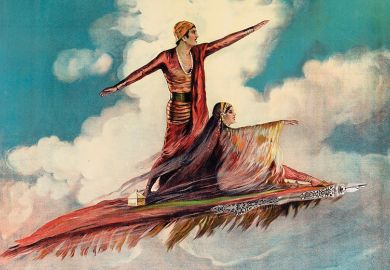The core of Stanley Wells's book is a rebuttal. He cites Philip Edwards's view of the evolution of Hamlet: "There was a point when Shakespeare had made many alterations to his play, mostly reflected in cutting rather than adding material, some of which he may have made after preliminary discussions with his colleagues among the Chamberlain's men. The play then became the property of these colleagues who began to prepare it for the stage. At this point we should arrest and freeze the play, for it is sadly true that the nearer we get to the stage, the further we are getting from Shakespeare."
Shakespeare, a good man fallen among theatricals. Wells will have none of this solemn absurdity and addresses himself to the general reader. His book is an account of Shakespeare's progress as a dramatist, coupled with an understanding description of what the plays mean, or can mean, in performance.
Wells's great strength is that he has seen the canon on stage many times over, and he uses this experience to illustrate issues in the text. In this he adopts the method pioneered by Alexander Leggatt, in Shakespeare's Comedy of Love. The Gardeners in Richard II, for example, can well be represented as monks, "intelligent and literate people who might (as Browning shows in his 'Soliloquy of the Spanish Cloister') also be full-time gardeners''. This was John Barton's way of declining the Mummerset trap. On the wider issues of interpretation and resolution, Wells makes the point on the ending of The Merchant of Venice: "What happens to Antonio? . . . Do [the lovers] include him in their happiness as they go off the stage? Does he go by a different exit? Does he stay alone on stage until the lights have gone down? Or until one of the lovers - which one? - returns to persuade him to join them? And in any case, how does he feel? We can only find out by going to see the next production."
The controversial inclusion of "Shall I die?'' in the Oxford Shakespeare is defended by Wells, rather oddly: "Some scholars, for reasons best known to themselves, have devoted an inordinate amount of effort to trying to prove that Shakespeare did not write it, but as the only piece of external evidence favours his authorship it must remain at least among the Shakespeare apocrypha unless new information comes to light.'' The scholars were pretty open about their reasons at the time, as I remember. And since when did "the only piece of external evidence'' justify promotion from apocrypha to canon?
But the reader will appreciate above all the siltings-down of Wells's experience. On Macbeth, "Duncan is the sort of role - there are many of them in this play - that an actor probably does not get much fun out of playing.'' There is a reason for this, as Wells shows. Shakespeare is concerned in Macbeth to drain the character of excessive individuality to enhance the ethical structure. In the ending of The Winter's Tale, "The emphasis is not on the young lovers but on the older generation.'' Such penetrating observations are harder to come by than might appear.
The Shakespearean canon can never be fully determined. "Sometime we see a cloud that's dragonish,/A vapour sometime like a bear or lion'', says Antony. The challenge comes in two areas especially: the collaboration plays and the apocrypha. Jonathan Hope brings to the challenge an analysis based on socio-linguistic evidence, in which the texts of the plays illustrate changes in early modern English.
"The key to socio-linguistic evidence is the fact that linguistic change is a process: when a change is in progress, the alternative forms will co-exist in the language.'' Through the concept of the linguistic variable, whose incidence can be measured quantitatively, Hope records the variations in linguistic form. He considers five plays to be a sufficient sample for establishing an author's usages; he is thus enabled to "divide a play between two named candidates, for whom there exists a group of non-controversial plays suitable for use as a comparison sample.'' Three types of usage are the foundation of Hope's investigation. The first is the use of the auxiliary "do''; the second the use of the relative marker, with present-day English giving us three choices, "The man that I know," ". . . whom I know," "[0] I know; and the third type the use of "thou'' and "you,'' which is here termed "T/V choice'' (tu/vous). A playwright of the era had a choice between constructions conforming to modern usage ("regulated") and those which did not ("unregulated"). Thus, in Henry VIII, "Alas, I know not'' is unregulated, and "I do not know/What kind of obedience I should tender'' is regulated. Hope reckons that we should always expect a higher proportion of regulated usages in Shakespeare's contemporary Fletcher than in Shakespeare because Fletcher was younger, better educated, came from the south-east (as against Shakespeare's upbringing in rural Warwickshire), and was of a higher social class. "All of these factors would suggest that Fletcher will use more incoming prestige variants than Shakespeare.'' This seems a promising guide to authorship.
The method, which Hope deploys with many graphs and statistical tables, seems to me of rather modest utility. My main doubt concerns the mysterious nature of collaboration. Everything we know of Shakespeare indicates that he was socially adaptable, intellectually accommodating and acquisitive. He must have had a regard for Fletcher, to have worked with him on several occasions. Who can say how much stylistic detail was absorbed by the other? Hope detects in Henry VIII "the adoption of a specific linguistic tactic in support of an attempt to write what was perceived as a new form of historical drama.'' He rightly sees Henry VIII "as a new genre - a sort of documentary history.'' Hence this "planned collaboration'' must have entailed joint support for a common style, and a certain erosion of individual traits. Another weakness in the method is its failure to draw distinctions between verse and prose.
So too much cannot be claimed for Hope's methods. In fact, his results tend to support beliefs that are already widely held. I give some of his main conclusions. Henry VIII is certainly a collaboration; Fletcher's role in it has been underestimated by Cyrus Hoy, and Hope re-assigns five scenes to him. For The Two Noble Kinsmen, however, Hope's assignment of scenes between Shakespeare and Fletcher is the same as in previous studies. He also supports the consensus that the first two acts of Pericles are the work of George Wilkins. He confirms Edward III as "the best candidate from the apocryphal plays for inclusion in the canon.'' Out of the textual revolution which has raged for a decade emerges a survivor from the past. Cool, unscathed, freshly-garbed, the Alexander Shakespeare (1951) is now reissued by HarperCollins. The text has been reset, introductions to each play supplied by a team of Glasgow University academics (Alexander's old university), and there are additional introductions by Germaine Greer and Anthony Burgess. The text is still as Alexander determined it. There is no attempt to engage with the textual controversies of recent years. What we have here is a handy one-volume text, less bulky than the Oxford.
I confess to strange emotions as I went through the Alexander. The two-text King Lear is still in the womb of time, and the single text here is undisturbed by prophetic nightmares in which "conflation'' equates with "hybrid'' and even "mule'' (Gary Taylor's word). Hamlet has "How all occasions do inform against me'' at the end of 4.4, as it always used to be; and not, as in G.R. Hibbard's recent Oxford edition, relegated to an appendix (because the soliloquy is not in the Folio, the control text for that edition). Falstaff remains Falstaff. Alexander would not dream of forcing upon him an identity change, to Oldcastle. That anorexic wraith, Innogen, has no place here. I have to say that I like all this.
It is conceivable that the revolution, having expended its fury, is now winding down leaving the old landmarks much as they were. My own reaction is one of exhausted relief. Many of us, certainly the general public, want a single text of King Lear and all other Shakespeare plays, and expect editors to supply just this. For teachers it is a low professional necessity: we do not (as with Richard III and Hamlet in the Oxford) want to fumble for "Additional Passages'' at the end of the text. How much of the revolution is irreversible, how much merely a fashionable re-ordering of certain practices considered sound a generation ago?
Progress is undular, not linear. A new edition of Shakespeare often strikes one as a performance, as much as a genuine improvement. The Definitive Shakespeare, that grail of editors, recedes into an endless series of ever-diminishing authority in which individual editors file their claims - well knowing that if nothing else the advance of stage practice will render them obsolete. And then some other editor will come along, look at "a table of green fields'' or "who dares no more is none'' or "Then I deny you stars,'' and decide that there is no case for disturbing the Folio reading. This is called radical conservatism.
The new Alexander has obvious limitations. There is no Two Noble Kinsmen (now widely admitted into the canon), and the short essays introducing each play are of variable quality. The one-page introductions to the Oxford edition are much more helpful. Still, Alexander remains a thoroughly respectable text, whose system of numbering every fifth line makes it easy to work with. It deserves a further happy and useful life. As a reviewer said of the Oxford, traditional Shakespeare has its rights.
Shakespeare remains an inexhaustible source of energy for later writers. Marianne Novy considers those women novelists who responded to Shakespeare's cultural presence, often "appropriating'' it in their work. Shakespeare was of course a wide field of allusion for almost all educated people; but Novy has no difficulty in showing that women novelists, from the late 18th century on, made specific and focused use of Shakespeare for their own purposes.
Jane Austen, for example, assimilated Shakespeare into the ironical treatment of romance. Much Ado About Nothing is linked with Pride and Prejudice, and the end of Persuasion suggests Twelfth Night. In Jane Eyre, Charlotte Bront 's "frequent allusions to Shakespearean tragedy suggest claims for the stature of its characters.'' These and other women novelists could rewrite Shakespeare from their own point of view. The central figure here is George Eliot, whose engagement with Shakespeare builds notably on that of her predecessors. Naturally, Eliot was fascinated with Rosalind and Portia, who take on a masculine name and a masculine disguise. She works in a number of other analogues. Felix Holt is seen as a Coriolanus figure, and in that novel the comedy most clearly alluded to is Measure for Measure. Such echoes do not always add up to a uniform position, as Novy admits. But there is no doubt that Eliot was reading the Sonnets when Middlemarch was taking shape. And "she draws on both As You Like It and Othello for a critique of marriage related to the social construction of gender . . .''. Novy finds Daniel Deronda the most consciously Shakespearean of Eliot's novels: "In its two plots, Daniel Deronda may be described as contrasting a realistic rewriting of As You Like It with a romantic rewriting of Hamlet.'' Novy goes on to examine a number of 20th-century novelists, noting that Virginia Woolf in Orlando makes over As You Like It into "a daring feminist rewriting of the Shakespearean comic plot". Orlando is one of the many explorations of contemporary culture, and its relation to tradition, that is Novy's subject matter. Here is another illustration of Jonathan Miller's metaphor, that Shakespeare is part of an expanding universe, matter being continuously created out of fundamental substance created centuries ago.
Ralph Berry is the author of three books on Shakespeare, most recently Shakespeare in Performance: Castings and Metamorphoses.
The Complete Works of Shakespeare
Editor - Peter Alexander
ISBN - 0 00 470671 4 and 470475 4 and 470474 6
Publisher - HarperCollins
Price - £35.00, £13.99 and £9.9
Pages - 1433pp



